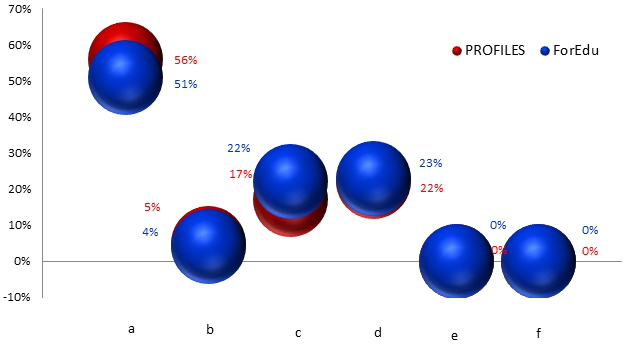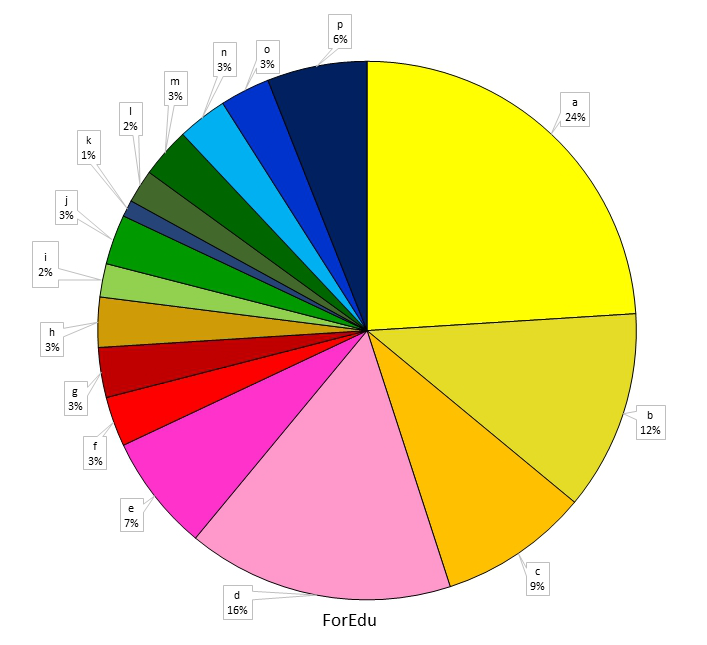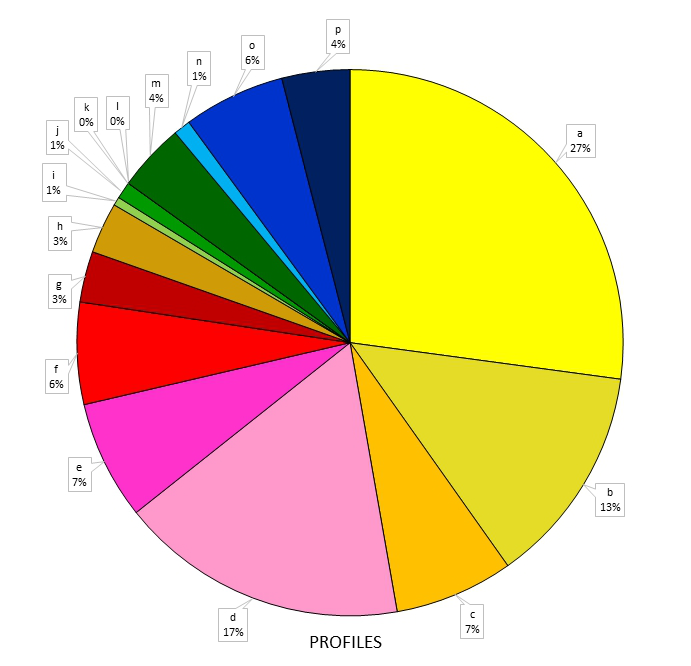Science Teachers’ Feedback Expressed After Participating in Two Continuous Professional Development Programs
Abstract
The paper presents an analysis on the science teachers’ feedback related to the efficiency of two training programs:
Keywords: Science teachers’ feedbacktraining programsPROFILESForEduprofessional development
Introduction
The fundamental goal of the current Romanian educational system is to provide a qualitative
education. A crucial variable on reaching this goal is represented by the teachers. Having in view the
societal changes, the transformations that took place at all the societal levels, with great impact on the
educational systems, the teachers have to be able to be fast connected and easily adapted to all those
changes. In this context, in many cases, their initial training is not sufficient to perform a qualitative
educational process, this one being needed to be supplemented with lifelong training, which must be
centered around the real needs and expectations of the teachers.
“Teacher professionalism is a crucial element on seeing the ‘education through science’
philosophy being meaningfully implemented by teachers, having as results the acquisition of the key
competences by students. An important approach to promote teacher professionalism is through the
development and enactment of professional development programs.” (Holbrook, Rannikmäe, &
Valdmann, 2014, p. 139).
Science education became a very important goal in school, so we can talk about “a strong
expectation for science to be an essential, or core subject in the school curriculum, for the benefit of all
students” (Holbrook, 2010, p. 82).
Coming to the particular aspects of science education, at the European level, in recent decades,
there has been recorded a significant decline in students’ interest and motivation for learning in general
and sciences (Physics, Biology and Chemistry) in particular (Rocard, 2007). Taking into account this fact,
Valahia University Targoviste, through its specialized unit - Teacher Training Department - designed and
conducted two dedicated training programs for science teachers: “Profiles - Education through Sciences”
and “ForEdu - Professionalization of the Teaching Career”, the last one comprising on four training
modules: “ICT - E-education”, “Designing and Implementing the Curriculum Oriented on Competences”,
“Classroom Management” and “Interactive Pedagogy”.
We briefly describe below, each of the two training programs.
1. The “Profiles - Education through Sciences” Continuous Professional Training Program was
developed in the frame of the European FP7 project entitled: “PROFILES - Professional Reflection
Oriented Focus on Inquiry-based Learning and Education through Science” - funded by the European
Commission -, which aims to promote education based on scientific investigation (IBSE - Inquiry Based
Science Education). The main objective of the training program is the professional development of
Sciences teachers (Chemistry, Physics and Biology), enriching their teaching competences, through
achieving teaching demarches oriented on scientific investigation and integrated related approaches
(based on the IBSE strategy) in their classrooms.
The originality of the PROFILES approach consists on paying special attention to the increasing
of science teachers self-efficacy. The self-efficacy consists - in this case - on raising the competences and
confidence in teaching, in a meaningful way - from the educational point of view -, and which can
motivate students. In the “PROFILES -Education through Sciences” training program, there have been
developed and implemented, during Sciences lessons, training modules centered on teaching through
scientific investigation, by promoting a student-centered learning model (Gorghiu, & Drăghicescu, 2014).
PROFILES aims to make science learning and specific science subjects more interesting, more relevant
and significant for secondary education students. This is not an easy objective to be reached – in this
respect, being known that teaching Science (and consequently teaching specific topics of Sciences) is not
so interesting for most of the students. Science classes are often described as too boring and irrelevant,
especially at ages 11-16 (Byrne, & Brodie, 2013, p. 28). Even active methods of teaching and learning, in
which students work in groups, fail to promote sciences for most of the students. Taking into account
those facts, the PROFILES project tried to solve at least a part of those problems.
The main objective of the “ForEdu - Professionalization of the Teaching Career” training
program - developed within a dedicated POSDRU project -, wastheformationanddevelopmentofprimaryandsecondaryteachers’competences,inordertoimprovethemanagementandqualityoftheeducationalprocess.
The ForEdu training program, through the design of its specific training strategy, and the concrete ways of fulfillment of all its activities, offers to primary and secondary teachers the following opportunities: access to modern teaching methods - that can become benchmarks for their own professional development; expansion and restructuring of the psycho-pedagogical knowledge; improvement of their skills for implementing new strategies and techniques for intervention in situations of (micro)educational crisis; development of IT competences; development of classroom management competences; continuous self-regulation of the pedagogical practice in relation to a plurality of roles assumed by the teachers: educator, trainer, manager, methodologist, evaluator etc.; training the teachers, considering them as resourceful persons for school and community, facilitating the exchange of ideas and best practices between members of the same professional community.
Methodology
The aim of the investigative approach consists in a comparative analyze related to science
teachers’ feedback, expressed after their participation in the abovementioned two continuous professional
development programs:
The research methodology is based on a dedicated feedback questionnaire, filled in by 156 science
teachers, enrolled in both programs, from three different counties: Dâmbovița, Buzău and Teleorman.
The questionnaire included items with predetermined answers offering multiple choices. To some
items, the teachers chose a descriptive phrase that corresponds to the situation in which they are,
following the graduation moment of the training program. There are several aspects taken into account:
the usefulness of the training program, the novelty of the training materials, the applicability in the
didactic process, the reason for participating in such programs etc. Other items are direct related to the
skills that have been acquired after participating in the training programs: the ability to create a learning
environment suitable for students, the measure in which the teaching approaches are oriented on students,
the achievement of particular knowledge concerning the design of the educational activities having in
view the increase of the quality, the efficiency on using different teaching methods, the efficiency on
using of a variety of teaching materials, the way in which it can be provided a relevant feedback for
students, the achievement of a better students’ progress, the providing of an adequate support for the
students with special educational needs, the designing of a new curriculum, the collaboration with
students’ families and local community, the designing of a more effective teaching career, the designing
of successful interschool projects, the use of ICT in a more efficient way.
The data processing was mostly statistical, in correlation with qualitative analysis, based on the
information gathered from discussions with the involved teachers.
In the following paragraphs, there are illustrated two relevant items collected from the
questionnaire.
Results and Discussions
The first item analyzed in this paper refers to the science teachers’ feedback related to the
usefulness and the novelty of both training programs (
participate to such training programs. The teachers had to choose from six different options: (a)
training programs seems to be useful for me; (b) just a few of the things learned in the program are
novelties for me; (c) from all the things I’ve learned in this program, I tried to apply a part in my
teaching activity; (d) from all the things I’ve learned in this program, I successfully applied two or three
things in my teaching activity; (e) I have difficulties to apply in my teaching activity things learned in this
program, because I don’t know how to do it yet; (f) I participate in the training program just to obtain
some credits.
Performing a comparative analysis on the responses of the two groups of science teachers (one
from
some differences (Fig.1). Both of the groups considered that the training program was useful (56%
few of the things learned in the program are novelties for them, which confirm the importance of the
transferred knowledge presented in both training programs. Analyzing the figure, we can easily observe
that none of the respondents chose the last two answer options, which indicate that the science teachers
are aware of the importance of their professional training and acquisition of real skills, not just intending
to get credits. From the comparative analyze, we can also observe some small differences between the
samples of teachers, meaning that

The next important item of the questionnaire refers to the skills the teachers obtained after the
participating in both training programs. Here, the teachers had sixteen options, from (a) to (p): (a)
a learning environment suitable for my students; (b) I design a good educational process, centered on
students; (c) I make a better design of my lessons; (d) I use more effective various teaching methods; (e) I
use a variety of teaching materials, more effectively; (f) I select the teaching contents better; (g) I can
provide more relevant feed-back for my students; (h) I asses the progress of my students better; (i) I better support students with special educational needs; (j) I design a new curriculum; (k) I collaborate more
effective with the students’ families; (l) I collaborate more effective with the school community; (m) I
collaborate more effective with other teachers; (n) I design more effective my teaching career; (o) I make
successful interschool projects; (p) I use ICT in a more efficient way.
Analyzing the two figures (Fig.2a and Fig.2b), we can find that the most of the teachers’ answers
correspond to the first answer options. So, the highest percentages were recorded by the first answer
options - (a) -, 27% from
important skills obtained after their participation in the training program are related to the creation of a
learning environment suitable for their students. The next place is occupied by the fourth answer option,
17% from
various teaching methods at the end of the training program. On the third place - in the perceptions of
both teachers’ samples - is the designing of a student-centered educational process.
We can also notice the differences between the answers of the teachers from both samples. The
program, are: educational design skills, using various teaching methods, using ICT in a more efficient
way and designing more effective their own professional career. In the other sample, the
teachers consider that the important skills, after their participating in the training program, are: a better
selection of the teaching contents, an effective collaboration with other school teachers and the
development of some successful interschool projects.


gathered in the
Conclusion
The whole analysis led to the idea that teachers are aware of the necessity of being permanent
involved in continuous training programs, which targeted to both direction: scientific preparation, but also
psycho-pedagogical / methodical training. Even there are a lot of similarities in terms of teachers’
answers collected from the mentioned training programs, it can be noticed that in the “Profiles -
Education through Sciences” program, where the activities were clearly focused on developing teaching strategies (mostly on IBSE - Inquiry Based Science Education), positive effects - at the level of formative
and informative acquisitions - were more evident. In addition, the teachers’ portfolios - based on a clear
imposed template - were strongly oriented on making connection between the science content - according
to the actual curricula - and the everyday life.
Acknowledgements
This work was funded through the Seventh Framework Program “
Reflection Oriented Focus on Inquiry-based Learning and Education through Science” No. 5.2.2.1 - SiS-
2010-2.2.1, Grant Agreement No. 266589, under the frame of: Supporting and coordinating actions on
innovative methods in Science education: teacher training on inquiry based teaching methods on a large
scale in Europe. The support offered by the European Commission in the fields of research and
innovation, through the project mentioned above, is gratefully acknowledged.
References
- Byrne, E., & Brodie, M. (2013). Cross curricular teaching and learning in the secondary school…
- science. Oxford, England: Routledge.
- Gorghiu, G., & Drăghicescu, L.M. (coord.) (2014). Educaţie prin Ştiinţe. Aspecte referitoare la
- instruirea bazată pe investigaţie ştiinţifică. Târgovişte: Bibliotheca.
- Holbrook, J. (2010). Education through science as a motivational innovation for science education for
- all.Science Education International, 21(2), 80-91.
- Holbrook, J., Rannikmäe, M., & Valdmann, A. (2014). Identifying teacher needs for promoting Education through Science as a paradigm shift in Science Education. Science Education International, 25(2), 133-171.
- Rocard, M. (2007). Science Education Now: A Renewed Pedagogy for the Future of Europe. Report EU22-845, Brussels.
Copyright information

This work is licensed under a Creative Commons Attribution-NonCommercial-NoDerivatives 4.0 International License.
About this article
Publication Date
25 May 2017
Article Doi
eBook ISBN
978-1-80296-022-8
Publisher
Future Academy
Volume
23
Print ISBN (optional)
-
Edition Number
1st Edition
Pages
1-2032
Subjects
Educational strategies, educational policy, organization of education, management of education, teacher, teacher training
Cite this article as:
Stăncescu, I., Gorghiu, G., & Petrescu, A. A. (2017). Science Teachers’ Feedback Expressed After Participating in Two Continuous Professional Development Programs. In E. Soare, & C. Langa (Eds.), Education Facing Contemporary World Issues, vol 23. European Proceedings of Social and Behavioural Sciences (pp. 841-846). Future Academy. https://doi.org/10.15405/epsbs.2017.05.02.102

